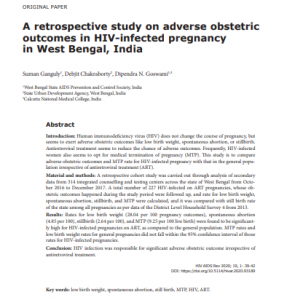
Prevention of parent-to-child transmission (PPTCT) basically aims at reducing the chance of transmission of human immunodeficiency virus (HIV) through vertical route. With proper antiretroviral treatment (ART), the chance of transmission reduces significantly.
Pregnancy does not seem to have an adverse effect on the natural history of HIV infection in women in most studies, although acquired immunodeficiency syndrome (AIDS) has become a leading cause of maternal mortality in some areas, as the epidemic progresses.
Adverse pregnancy outcomes that have been reported in HIV-positive women include increased rates of spontaneous early abortion, low birth weight babies, and stillbirths, preterm labor, preterm rupture of membranes, other sexually transmitted diseases, bacterial pneumonia, urinary tract infections, and other infectious complications [1].
When taking reproductive decisions, the women living with HIV and AIDS take into consideration the fact they live with HIV and the possible risk of transmission of the virus to the fetus. Furthermore, they are subject to individual factors, social aspects, and cultural expectations.
The literature on post-diagnosis abortion is quite limited [2], but indicates that the risk of transmission of the virus to the fetus was one of the factors that weighed on reproductive decisions. The introduction of the protocol for prevention of mother-to-child transmission (PMTCT) has produced a decrease in the rate of pregnancies ended in induced abortion [3].